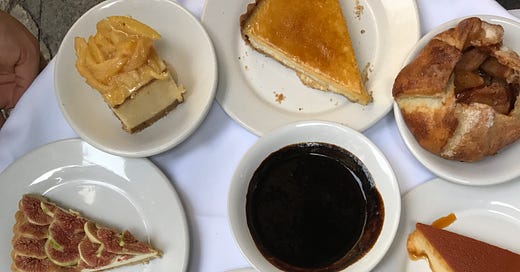5 weeks to launch: some influencer friendships are a performative art
be okay with not being completely understood
Welcome to my book launch series, where each week leading up to my pub date, we dive into a topic from the book. Today, we’re talking about influencer friendships. You know the ones you see online every day. Are they real? Are they true? What’s really happening below the surface?!
Like my work? Pre-order my book!
When you’re an online creator, teaming up, hanging out, and making content with other influencers can be vital to your success. It not only boosts your credibility, but it also cross-pollinates audiences and helps everyone grow.
When I used to hang with other wellness influencers, people would comment on our photos together like, “OMG, two of my favorite people in a room!” It felt good, of course.
Befriending influencers wasn’t just good for business; it was also a vital way to learn how to do my job.
As one of the first Instagram influencers, we were charting a whole new career path in real time, so we relied on each other for lessons, insights, and emotional support as we navigated the strange world of turning our lives into content.
I remember watching one influencer interact with fans IRL. She’d beam, shake hands, and gush with them—and as soon as they walked away, she turned to me and said, “They’re my customers. I’m always nice to them.”
That kind of compartmentalization stuck with me.
An influencer friend was also someone to talk to about the weird parts of the job. We’d trade notes on rates, managers, and brands to avoid, like the ones that chronically underpay or ghost creators. It was vital to rely on eachother in this way in the early days. This was all before FTC guidelines even made it a law to write #sponsored.
On many of the influencer trips I went on, I can’t say those friendships were based on much more than work, and in many ways, that’s okay. They served a purpose in the moment. That’s something I’ve come to recognize and even appreciate.
But a few of those friendships were more than just momentary. They were genuine, beautiful, and deeply helpful.
In my 20s, I believed that all friendships should last forever and be built on deep interpersonal trust. But in my 30s, thanks in part to a podcast episode I heard last year that changed my brain, I’ve come to understand that some friendships are meant just for a season, a specific purpose. That doesn’t make them any less helpful, beautiful, or meaningful while they last.
Still, it was hard to find a real connection in LA. Everyone always seemed to want something: visibility, status, access, or money.
Many of the influencer friendships I witnessed were tinged with cattiness and competition. There was always an unspoken fear of someone outgrowing you.
“That one’s a secret Jesus freak.”
“Why doesn’t she ever post her husband on main?”
“Dude, she’s totally copying you.”
It wasn’t far off from high school.
At one point, a fellow influencer became obsessed with convincing me and a few others to turn against someone she didn’t like. She’d send me screenshots of a girl she thought was copying my work. “Lee, you posted a smoothie on Tuesday and she posted almost the same thing on Wednesday…” Then, “Man, I’m so sorry you’re dealing with this. It sucks she’s stealing your ideas.”
I wasn’t worried about this copycat, and I didn’t know how to handle the manipulation. I just changed the subject and stayed on her good side.
The truth is tricky. Befriending influencers can change your life and catapult you into fame, but it also puts you at risk if and when the friendship ends. You’re then in the crosshairs and may be pulled into drama.
It can be a real connection… with career stakes. And that makes it weird.
Think about your closest friend. Now, imagine broadcasting that relationship to hundreds of thousands of people. It’s now under a microscope, and, because the “waters” are not part of the friendship in real life, it can never be fully understood.
But one of the biggest lessons I’ve learned, and the advice I’d give anyone stepping into this world, is: don’t try to be fully understood. It’s a fool’s errand. Your audience will never completely know you. And in some ways, that’s a beautiful thing.
On writing a memoir based on real people:
It’s a tricky thing writing about real people. For my book, I gave some influencers pseudonyms to protect their identities.




